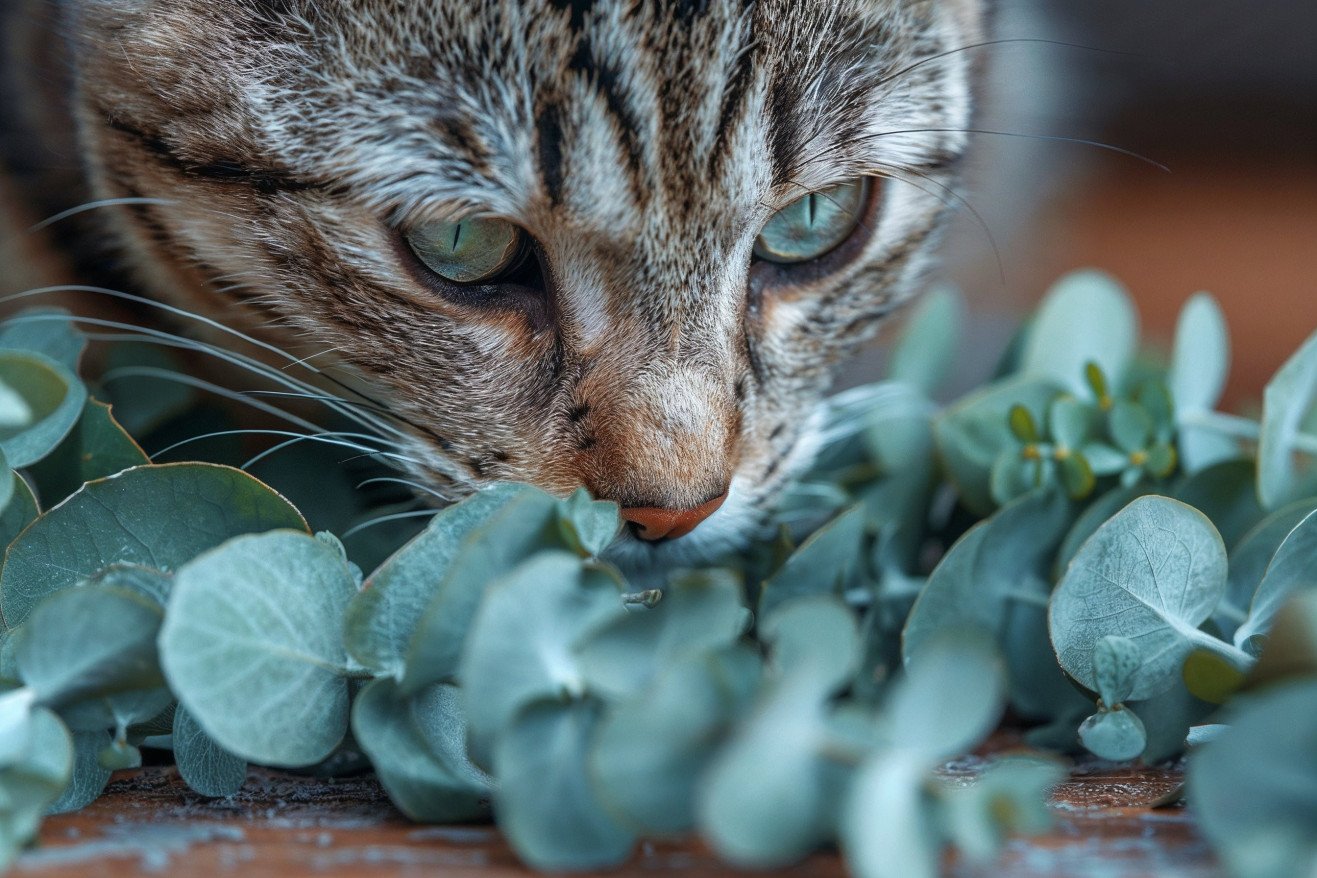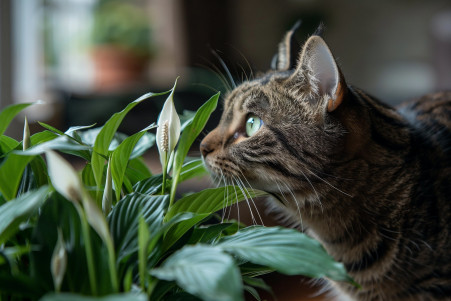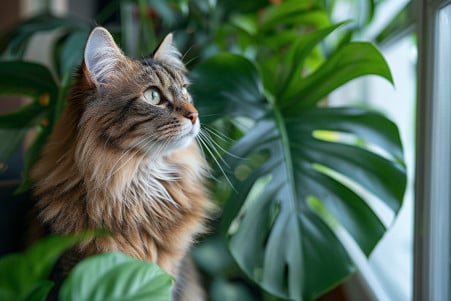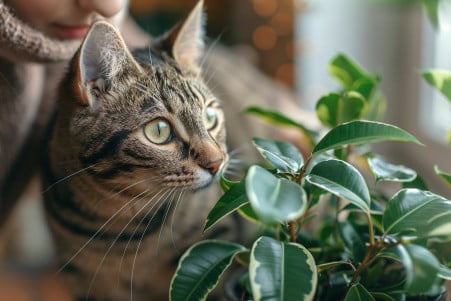Can Eucalyptus Hurt Cats? Dangers and Safety Measures
5 May 2024 • Updated 4 May 2024

Are eucalyptus leaves safe for cats to eat, or are the oils and other compounds in eucalyptus toxic to cats? Eucalyptus leaves contain volatile oils, including eucalyptol, that can be poisonous to cats if they are consumed. These oils can lead to symptoms such as vomiting, diarrhea, drooling, lethargy, and ataxia in cats. Although not all eucalyptus species are equally dangerous, it's best to err on the side of caution and avoid exposing cats to any eucalyptus plants.
To learn more about the dangers and impact of eucalyptus on cats, this article will explore research from both veterinary medicine and botany. Topics to be discussed include the chemical compounds in eucalyptus that are toxic to cats, the signs and symptoms of toxicity, as well as ways to prevent and treat accidental poisoning. By the end, you'll have all the information you need to keep your furry friend safe around these plants.
Can eucalyptus hurt cats?
What Causes Eucalyptus Poisoning in Cats?
Eucalyptus contains a number of volatile compounds including eucalyptol, which is the main toxic component for cats. According to the Pet Poison Helpline, cats don’t have the enzymes needed to metabolize and eliminate eucalyptol from their bodies, which causes it to accumulate.
When cats eat eucalyptus, it can cause gastrointestinal symptoms such as vomiting and diarrhea, as well as neurological symptoms such as tremors, ataxia (loss of coordination), and in severe cases, seizures. As Dr. Cristina Bustamante points out, eucalyptol can even cause organ damage if it’s not metabolized by the body.
The concentration of these toxic compounds can vary between different species of eucalyptus and different parts of the plant, such as the leaves, bark, and so on. However, essential oils and other concentrated forms of eucalyptus are especially dangerous because they contain high levels of compounds like phenols that cats can’t metabolize. Although fresh eucalyptus may be less toxic than concentrated forms, all forms are dangerous and should be kept away from cats. It’s important to be aware of and monitor for any exposure to avoid severe poisoning.
How to Tell If Your Cat Has Eaten Eucalyptus
The most common signs of eucalyptus poisoning in cats are vomiting, diarrhea, drooling, and lethargy, according to the ASPCA. More serious symptoms can include tremors, seizures, ataxia (a lack of muscle control), and incoordination, according to the Pet Poison Helpline. Inhaling eucalyptus oils can lead to respiratory symptoms, such as coughing and labored breathing, says Dr. Cristina Bustamante.
Signs of poisoning can develop within a few hours of exposure or ingestion but may be delayed. The severity of symptoms can vary from mild stomach upset to organ damage or failure, depending on the amount of eucalyptus the cat has been exposed to and the cat's individual tolerance, according to the Pet Poison Helpline and Dr. Bustamante. Veterinary care is important, especially if the symptoms are severe or don't improve quickly.
Emergency Response: What to Do If Your Cat Eats Eucalyptus
If you think your cat has eaten eucalyptus, call your vet or a pet poison control hotline right away, as the ASPCA advises. Do what they tell you, which might involve vomiting or giving activated charcoal to absorb the toxins, according to the Pet Poison Helpline. Take any leftover plant or product to the vet so they can figure out what it is and how to treat it.
Your cat might need supportive care like IV fluids and observation, especially if the poisoning is severe, says Dr. Cristina Bustamante. The sooner you get your cat to the vet and they get treatment, the better the chance that your cat will recover fully. You can make sure your cat gets the help they need by acting fast and following the advice of the professionals you consult.
How to Make a Cat-Friendly Garden: Safe Plant Options
If you're planning an outdoor garden for your cat, it's important to make sure that you don't include any eucalyptus or other toxic plants. According to Gardening Know How, some of the best safe, cat-friendly plants to include in your garden are catnip (Nepeta cataria), cat grass such as oat grass (Avena sativa) and wheatgrass (Triticum aestivum), asters, sunflowers, and maiden grass (Miscanthus).
In addition to plants, you can also make the outdoor environment more stimulating for cats by including areas for play, hiding, scratching, and toileting, as suggested by Battersea Dogs & Cats Home. To help keep cats away from certain areas, you can also include plants that have scents that cats don't like, such as lavender or rosemary, according to Meow Blog.
Before you add any new plants to a garden that cats can access, it's important to make sure that they're not toxic to cats. To check the toxicity of different plants, you can refer to the ASPCA, which has a list of plants that are toxic and non-toxic to pets.
How to Keep Cats Safe Indoors: Plant Options and Deterrents
If you have indoor plants, opt for non-toxic varieties such as spider plants (Chlorophytum comosum), parlor palms (Chamaedorea elegans), and Boston ferns (Nephrolepis exaltata 'Bostoniensis') listed by Architectural Digest. To help prevent your cat from nibbling on your plants, make sure to have cat-safe options like cat grass or catnip available, says Purina.
To keep your cat away from your plants, you can also use deterrents like bitter sprays, double-sided tape, and physical barriers, according to Preventive Vet. Make sure all plants are either out of your cat's reach or enclosed in a way that prevents your cat from accessing them to avoid accidental ingestion. In addition, always keep an eye on and research any new plants that you bring into your home to make sure they're cat-friendly, notes The Spruce.
Conclusion: How to Keep Cats Safe From Eucalyptus and Other Plants
Eucalyptus plants contain essential oils, such as eucalyptol, that are poisonous to cats when ingested. Cats don’t have the enzymes needed to break down and eliminate these oils, which leads to a toxic buildup in their bodies. This can result in a range of symptoms, including gastrointestinal distress, neurological problems, and even organ failure.
The toxicity of eucalyptus can depend on the species of the plant and the specific part of the plant that’s ingested. However, the oils and other concentrated forms of eucalyptus are more dangerous because they contain higher levels of compounds like phenols that cats can’t metabolize. While fresh eucalyptus may be less dangerous than eucalyptus oils, all forms of eucalyptus can be toxic to cats and should be avoided.
Common symptoms of eucalyptus poisoning include vomiting, diarrhea, drooling, lethargy, tremors, seizures, and respiratory distress. The severity of the symptoms can vary from mild to severe and life-threatening based on the amount of eucalyptus that’s been ingested and the sensitivity of the cat. If a cat does ingest eucalyptus, it’s important to get them to a veterinarian as soon as possible for treatment. With the right precautions and interventions, cat owners can ensure that their pets are safe and healthy in their home environments.


